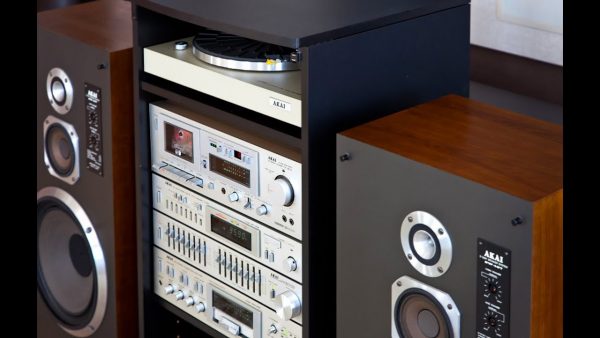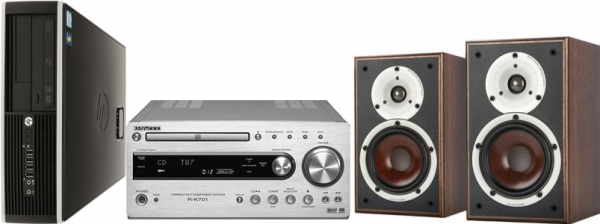 I am old enough to remember that my first experiences of listening to serious music on serious equipment involved visits to my brother-in-law and borrowing his component hifi for the afternoon!
I am old enough to remember that my first experiences of listening to serious music on serious equipment involved visits to my brother-in-law and borrowing his component hifi for the afternoon!
I "progressed" from that to, in the late eighties, listening on my very own 'integrated' hifi (which, given my income levels at the time, was pushing the term 'hifi' to its limits, I now realise!)
So what does the listening equipment look like in these days of digital music?
Well, something like this:
...which is to say that my (fairly old - vintage 2012) HP desktop has been fitted with a decent audio card which outputs into the AUX socket of a Kenwood amplifier. That then pumps the sound out to my reasonably-decent bookshelf speakers. It isn't exactly audiophile quality music reproduction, but it serves me and my 55-year-old ears quite well enough!
I may write about the hardware makeup of that music reproduction chain in more detail later on -but today I wanted to look more closely at that PC. What's running on it to enable a music signal to be pumped to the amplifier in the first place? In short, what sort of digital music playing software am I using?
First thing to say is that the PC runs Windows 10. This will shock some people of my acquaintance from the days when I was running Oracle databases: back then, if it wasn't Linux or Solaris, it wasn't my cup of tea. But if you don't have a professional need to run non-Windows operating systems, I rather suspect that 99% of people will run Windows -and therefore, in order not to bamboozle my readers with operating system technicalities that are of no interest to them at all, I decided to switch to using Windows, too. I use Windows 10 these days too, rather than (say) Windows 7 or 8, because Windows 7 is rapidly coming to the end of its supported life. Give it a couple of years, and Windows 7 will be a distant memory (and Windows 8 is already a sadly-remembered nightmare!).
So the operating system is pretty much bog-standard Windows fare. What about the music playing software I use?
Bear in mind that listening to music is only one function required of music playing software. Unless your entire music collection is the 21st century equivalent of three 78s and a couple of LPs, you will want your music 'player' to also be your music 'library': something that will let you quickly step through all your music in an organised, methodical way -and preferably something that doesn't get in your way as you try to navigate your collection by deciding to sort compositions by, say, the year in which they happen to have been recorded (it happens!).
For many years, the one piece of software I found met the playing and library functions almost perfectly was Foobar2000. It takes a minimalist approach to doing things (which is great: the last thing you want is a quirky, in-your-face program interface getting between you and your music), so it takes a bit of work to knock it into usable shape, but it is otherwise highly functional and very configurable. I had assumed, therefore, that I'd be recommending everyone to go and install Foobar2000 as their music playing software.
Instead, however, I decided to step back a bit and take a hard look around the software landscape of late 2019. It's taken me a lot longer to write the resulting comparative review article than I'd ever expected, but it's now available to be read by all. In that article, I review around 11 significant digital music player/organisers that are Windows-based and completely free of cost to obtain and use. The requirement for a player to also be a music organiser means I didn't review programs like VLC or MPC, which are both superb media players but lack a good, persistent library capability.
The results surprised me in several respects. For one, the ultimate winner wasn't Foobar2000 (though it was a close-run thing!) For another, some of the music playing software out there is utterly attrocious and it surprises me that developers can push out such crud with a clear conscience!
Anyway, I won't spoil the surprise any further: the summary review is available from the Technical articles page, though it links through to detailed reviews of each program in turn. Click around and enjoy!
